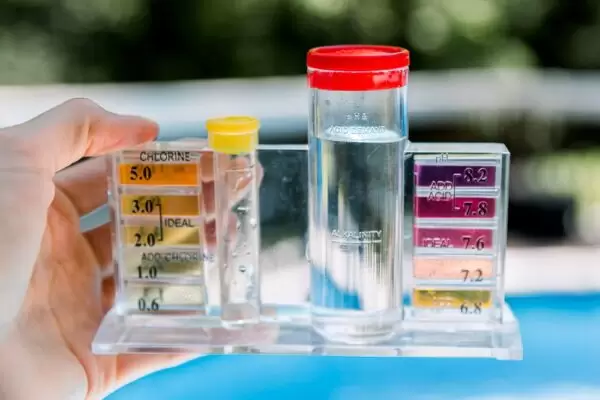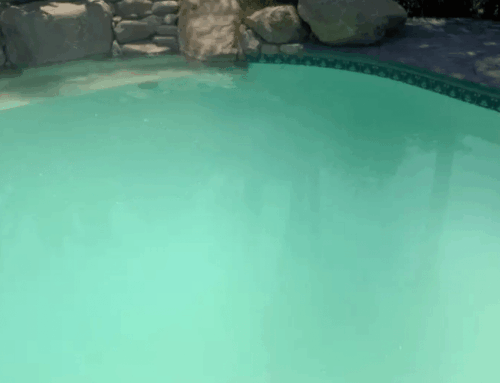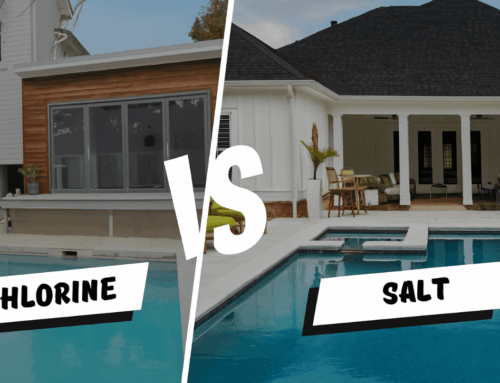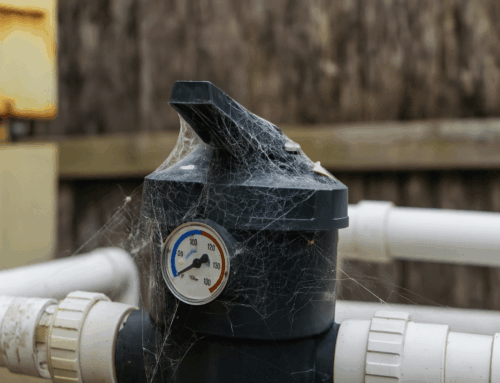Accurate pool water testing keeps your swimming pool clear, safe, and affordable to maintain. The right kit tells you when free chlorine is too low, when pH is out of range, and when total alkalinity or cyanuric acid needs correction. This buyer guide explains why testing matters, how often to test, which parameters to measure, and which pool test kits suit different pool owners, including saltwater pools.
Why do you need to test your pool water?
Testing confirms water quality and guides precise chemical dosing so you avoid cloudy water, algae growth, and equipment damage. Without accurate readings, it is easy to underdose sanitiser or chase pH swings with guesswork, which wastes time and pool chemicals.
Benefits of regular testing
- Prevents algae by keeping free chlorine in the target range
- Improves swimmer comfort by holding pH between 7.2 and 7.6
- Protects surfaces and heaters by controlling total alkalinity and calcium hardness
- Saves money by dosing the correct amount of pool chemicals
How often should you test your pool water?
Test free chlorine and pH two to three times per week in summer and at least weekly in winter. Test total alkalinity weekly, cyanuric acid monthly outdoors, and calcium hardness every one to three months or after large top ups. After heavy rain or a big pool party, test the same day.
Quick cadence
- Free chlorine and pH: 2 to 3 times per week in warm weather
- Total alkalinity: weekly
- Cyanuric acid: monthly for outdoor pools
- Calcium hardness: every 1 to 3 months
- Salt levels in saltwater pools: monthly, and after large water changes
What should you test for in pool water?
Measure the core parameters that control clarity, comfort, and corrosion.
Core set
- Free chlorine (FC): active sanitiser that destroys bacteria and algae
- Combined chlorine (CC) or total chlorine (TC): indicates chloramine build up
- pH: controls sanitiser strength and swimmer comfort
- Total alkalinity (TA): buffers pH to prevent rapid swings
- Cyanuric acid (CYA): stabiliser that protects chlorine from sunlight outdoors
- Calcium hardness (CH): protects plaster and heaters from etching or scale
- Salt (for saltwater pools): keeps the chlorinator within its operating range
Optional checks
- Phosphates and metals: only if algae persists or staining appears
- Total dissolved solids: useful for spas or very old water
What are ideal chemical levels for a swimming pool?
Stay within these targets for most residential outdoor pools. Adjust for local codes and your surface type.
Typical targets
- Free chlorine: 2 to 4 ppm in summer, 1 to 3 ppm in cooler months
- Combined chlorine: below 0.5 ppm
- pH: 7.2 to 7.6
- Total alkalinity: 80 to 120 ppm
- Cyanuric acid: 30 to 50 ppm outdoors
- Calcium hardness: 200 to 300 ppm for plaster, 150 to 250 ppm for fibreglass and vinyl
- Salt: per manufacturer range, often 3000 to 4000 ppm
What is the difference between pH and chlorine testing?
pH measures how acidic or basic the water is, while chlorine testing measures sanitiser strength. Low pH increases corrosion risk and irritates eyes. High pH weakens chlorine. Test both together so you know whether to adjust dosing or balance first.
Are pool test strips accurate?
Good test strips provide quick guidance when used correctly, but they are less precise than liquid reagent kits. Strips can drift when exposed to air and humidity, and colour matching can be subjective. Use fresh strips, dip for the exact time, hold level, and read under neutral light. For dosing decisions that require precision, confirm with a liquid test kit.
When strips shine
- Fast spot checks during the week
- Quick confirmation after top ups or light rain
- Backup method when kids or guests are swimming
Can you use a digital tester for pool water?
Yes. Digital photometers and smart sensors reduce guesswork and can be very accurate when calibrated and maintained. Photometers read colour changes from reagents, while connected monitors track parameters like free chlorine and pH continuously. Follow the manufacturer’s instructions for calibration and keep vials clean for reliable results.
Digital option pros and cons
- Pros: easy to read, good repeatability, data logging
- Cons: higher upfront cost, battery or charging requirements, periodic calibration
What happens if your pool water is unbalanced?
Unbalanced water turns cloudy, encourages algae, and can corrode metals or scale surfaces. Low free chlorine lets microorganisms grow. High pH reduces sanitiser strength. Low alkalinity leads to pH drift. High calcium with high pH can cause scale on heaters and tiles.
What causes cloudy or green pool water?
Low free chlorine, high pH, heavy debris, and poor filtration are the usual triggers. After storms or pool parties, test and correct quickly. If green persists after shock treatment, consider metals or a high stabiliser level that binds chlorine; use our green pool recovery guide if needed.
How do pool test kits work?
Kits use either liquid reagents or treated pads to show a colour change that corresponds to a concentration on a chart. Liquid drop tests measure volume and drops to reach a colour endpoint. Strips develop colours on pads. Digital photometers read the change with a light sensor and display a numeric result.
Best pool test kits in 2025
The best swimming pool test kits combine accuracy, ease of use, and clear instructions. Below are recommended options across liquid test kits, digital testers, and test strips, including salt testing for saltwater pools. Match the kit to your pool type and your comfort with testing.
Which liquid test kits are most reliable?
Liquid reagent kits deliver the most precise readings for home users. Choose kits that test free chlorine with a drop count method and include pH, total alkalinity, calcium hardness, and cyanuric acid.
Taylor K-2006 (FAS DPD Chlorine)
Best overall for accuracy on chlorine, with a full chemistry set.
- Tests: free chlorine by FAS DPD, combined chlorine, pH with acid and base demand, total alkalinity, cyanuric acid, calcium hardness
- Why it stands out: the FAS DPD method reads free chlorine to 0.2 ppm resolution and up to very high levels after shock
- Ideal for: pool owners who want precise dosing and clear instructions
- Consider: keep reagent refills on hand and store them cool and dark
Taylor K-2005 (DPD Colour Match)
Reliable full kit when ultra high chlorine readings are not essential.
- Tests: similar core set to K-2006 but uses colour matching for free chlorine
- Why it stands out: proven, robust kit at a lower price
- Ideal for: owners who want a full chemistry kit and are comfortable with colour charts
Taylor K-1766 (Salt)
Go to liquid kit for saltwater pools.
- Tests: salt as sodium chloride in ppm
- Why it stands out: simple procedure with clear endpoint for salinity checks
- Ideal for: any saltwater pool with a chlorinator that requires a specific range
Poolmaster 5-Way Test Kit
Budget friendly liquid kit for core checks.
- Tests: free and total chlorine, pH, total alkalinity, acid demand
- Why it stands out: accessible price with clear vials and instructions
- Ideal for: small pools or owners who want a simple starter kit
Which digital testers reduce guesswork?
Digital photometers and handheld readers offer quick, repeatable results. They are excellent when you do not want to interpret colour charts or when family members share maintenance.
LaMotte ColorQ 2X Pro 7
Comprehensive digital meter with simple workflows.
- Tests: free and total chlorine, pH, total alkalinity, calcium hardness, cyanuric acid
- Why it stands out: lab style clarity without charts
- Ideal for: owners who value convenience and clear numeric readings
- Consider: protect the meter from splashes and keep vials spotless for accuracy
Connected monitors and smart sensors
Hands off options that watch key levels for you.
- What they do: track pH and chlorine, send alerts, and log trends over time
- Ideal for: busy households that want reminders and historical data
- Consider: subscription costs, probe care, and calibration steps
Which test strips are worth using?
Strips are fast and low cost with acceptable accuracy for routine checks when handled correctly. Replace the bottle when pads fade or when the expiry date passes.
AquaChek Select Connect or similar multi parameter strips
Convenient test strips for weekly checks.
- Tests: free and total chlorine, pH, total alkalinity, cyanuric acid, hardness
- Why they stand out: quick dip, simple chart or app guidance
- Ideal for: quick weekday checks and for teaching new pool owners
Salt test strips for saltwater pools
Dip strips that read salinity in ppm.
- Use case: confirm chlorinator range after top ups or heavy rain
- Tip: pair with a liquid salt kit if strips give inconsistent results
How do you choose the best test kit for your pool?
Match the kit to your pool type, your tolerance for detail, and your budget.
Selection checklist
- Pool type: saltwater pools need a salt test in addition to the core set
- Precision needs: choose FAS DPD liquid testing for precise free chlorine control
- Ease of use: pick a digital meter if charts are frustrating
- Speed: use strips for quick checks and confirm with liquid tests for dosing
- Reagent refills: check availability and shelf life so you always have fresh reagents
How do you take a proper water sample?
Collect water elbow deep away from returns for an accurate snapshot. Rinse vials with pool water three times before filling. Cap and test promptly to avoid changes from sunlight or air.
Sampling tips
- Take samples from the deep end away from the return jets
- Avoid sampling right after chemical dosing or shocking
- Keep vials clean and dry between tests
How do you use a liquid test kit correctly?
Follow the instructions exactly and record results so trends are visible. Count drops carefully, hold bottles vertical, and read colour endpoints under neutral light.
Good practice
- Shake reagents if the label instructs
- Wipe vials between tests to avoid cross contamination
- Use a notepad or app to log results and chemical additions
How do you read test strips accurately?
Dip once, hold level, wait the specified time, and compare under neutral light. Do not shake off water or wipe the pads. Replace the cap quickly to keep moisture out of the bottle.
How do you maintain a digital tester?
Keep vials and cuvettes spotless and calibrate when the manual recommends. Rinse with distilled or clean fresh water and dry with a lint free cloth. Replace batteries on schedule and store the meter out of direct sun.
What should you do after testing?
Dose only what you need, in small steps, and retest. Add chemicals to water, not water to chemicals. Space additions 30 to 60 minutes apart with the pump running so changes show clearly.
Dose smart
- Raise free chlorine with liquid chlorine or adjust the salt chlorinator output
- Lower pH with a measured dose of acid, raise with soda ash
- Adjust total alkalinity with baking soda in small increments
- Set cyanuric acid with stabiliser additions outdoors and avoid overshooting
What should you avoid when testing?
Avoid old reagents, dirty vials, and reading colours in harsh sun. Do not store kits in hot pump rooms. Replace reagents at the start of each swimming season or when the expiry date passes.
Troubleshooting quick answers
Readings jump day to day
Check for sampling near return jets, reagent age, or inconsistent lighting.
Chlorine reads zero but water smells strong
You may have high combined chlorine. Shock to break down chloramines and retest.
pH will not hold
Verify total alkalinity. Very low TA allows pH to swing. Very high TA can lock pH high.
Salt cell says low salt but strips read normal
Clean the cell and confirm with a liquid salt test. Sensors can drift when plates scale.
Water stays cloudy after good numbers
increase run time, clean the filter, and consider a clarifier; if you use sand/media, review backwashing; for cartridges, see cleaning filter cartridges.
Bottom line
The best swimming pool test kits give you accurate readings so you can dose precisely and keep crystal clear pool water year round. For most pool owners, a liquid FAS DPD kit for chlorine plus a reliable pH and alkalinity test covers daily needs. Add calcium hardness and cyanuric acid monthly, and include a salt test for saltwater pools. Use digital meters if you want easy to read numbers, and keep strips for quick spot checks. Test regularly, record results, and your pool will stay balanced with less effort and lower cost. If you’d prefer a set-and-forget routine, book professional pool cleaning services to handle testing and balancing for you.

With over 20 years of industry experience, Adrian Mole is the founder of 1 Pool Care, a leading mobile pool service in Perth. Known for his expert knowledge and reliable service, Adrian delivers professional pool cleaning, equipment repairs, and water balancing across the metro area. Backed by SPASA accreditation, he’s committed to quality, convenience, and customer satisfaction.












Social Media